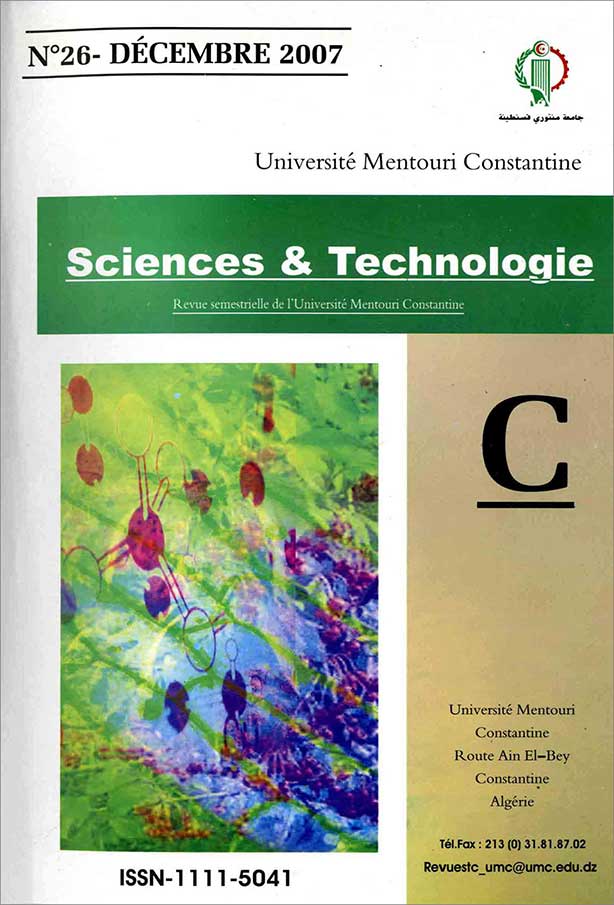NOVEL HIGH AFFINITY INHIBITORS BASEDON THE CHEMICAL MODIFICATIONS OF 3, 4 DIHYDROXY BENZOIC ACID : DOCKING SIMULATIONS ON LIPOXYGENASE
الكلمات المفتاحية:
Binding Energy، Docking، Modeling، Enzyme-Inhibitor Complex، Lipoxygenase، Interaction protein-ligandالملخص
Modeling enzyme-inhiubitor interactions using FlexX program allowed to design novel high affinity inhibitors of soybean lipoxygenase (LOX-3). Docking results show that the binding energy of the enzyme with its inhibitor 3,4 dihydroxy benzoic acid (DHB) is ∆G = -10.564 Kj/mol. .This binding energy enhances when a hydroxyl group is added on the ring of DHB (∆G = -16.959 Kj /mol) or its carboxylic group is replaced by other functional groups, particularly a methyl hydroxyl group (∆G = - 21.127 Kj/mol). Docking study may be useful to improve the biological activity of a compound for a given target.المراجع
- Kellenberger, E., Rodrigo, J., Muller, P and Rognan D. (2004). Comparative Evaluation of Eight Docking Tools for Docking and Virtual Screening Accuracy. Proteins 57, 225-242
- Cleves, A. E. and Jain, A.N. (2006). Robust Ligand- Based Modeling of the Biological Targets of Known Drugs. J Med Chem. 49, 2921-2938.
- Gohlke, H., Hendlich, M. and Klebe, G. (2000).Predicting binding modes, binding affinities and ‘hot spots’ for protein-ligand complexes using a knowledge-based scoring function.Perspectives in Drug Discovery and Design.20,115–144.
- Schneider, G. and Bohm, H. J. Virtual screening and fast automated docking methods. (2002). Drug Discovery Today 7, 64-70.
- Jorgensen, W. L. (2004). The many roles of computation in drug discovery. Science 303, 1813-1818.
- Abagyan, R. and Totrov, M. (2001). High-throughput docking for lead generation. Curr. Opin. Chem. Biol.5, 375-382.
- Shoichet, B. K. (2004). Virtual screening of chemical libraries. Nature 432, 862-865.
-Yamamoto, S. (1992). Mammalian lipoxygenases: molecular structures and functions. Biochim Biophys Acta 1128, 117–131.
- Siedow, J.N. (1991). Plant lipoxygenase:structure and function. Annu Rev Plant Physiol Plant Mol Biol. 42, 145–188.
- Praveen Rao, P. N., Qiao-Hong Chen and Knaus, E.E. (2005). Synthesis and biological evaluation of 1,3diphenylprop-2-yn-1-ones as dual inhibitors of cyclooxygenases and lipoxygenases. Bioorg. Med. Chem. Lett. 15, 4842–4845
- Borbulevych, O.Y., Jankun, J., Selman, S.H and Skrzypezak-Jankun, E. (2004). Lipoxygenase Interactions With Natural Flavonoid, Quercetin, Reveal a Complex With Protocatechuic Acid in Its XRay Structure at 2.1 A˚Resolution. PROTEINS. 54, 13–19.
- RCSB Protein Data Bank, operated by the Research Collaboratoryu For structural Bioinformatics
- BioSolvelt GmbH, An der Ziegelei 75, D-53757 Sankt Augustin, Germany.
- Rarey, M., Kramer B., Lengauer T. and Klebe, G. (1996). A fast flexible docking using an incremental construction. J. Mol. Biol. 261, 470-489.
- Rarey, M., Kramer, B. and Lengauer,T. (1999).Docking of hydrophobic ligands with interactionbased matching algorithms. Bioinformatics 15, 243.
- Böhm, H. J. (1994). The development of a simple empirical scoring function to estimate the binding
constant for a protein-ligand complex of known threedimensional structure.Comput.-Aided Mol Des. 8, 243-256
- Gohlke, H., Hendlich, M. and Klebe, G. (2000).Knowledge-based scoring function to predict proteinligand interactions. J. Mol. Biol. 295, 337-356.
- Cole, J.C., Murray, C.W., Nissink, W.M.,Taylor and R.D.; Taylor, D. (2005). Comparing protein-ligand docking programs is difficult. PROTEINS 60, 325-332.
- Lipinski, C. A., Lambardo, F., Domini, B.W., Feney, P.J. (1997). Experimental and computational approaches to estimate solubility and permeability in drug discovery and development settings. Adv. Drug Deliv. Rev. 23, 3-25

